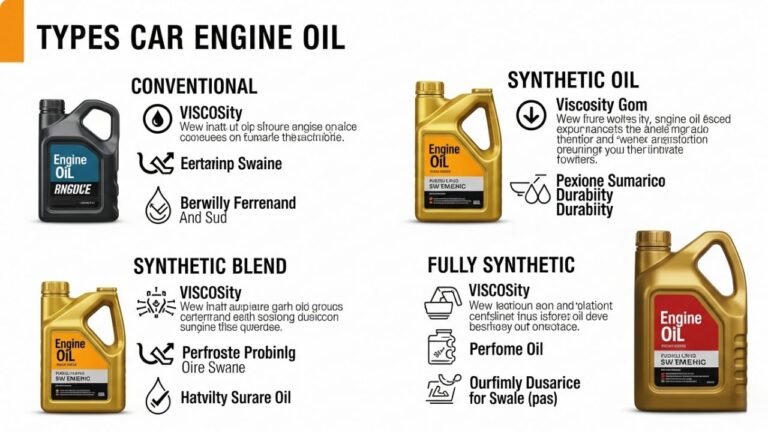What Oil My Car? Best Oil for Your Ride

Ever stood in the car parts store, scratching your head, wondering what oil my car actually needs? Don’t worry, you’re not alone. I’ve been there too, lost in a sea of bottles with fancy labels. Trust me, it can feel like picking a magic potion for your car’s beating heart. But choosing the right oil doesn’t have to feel like reading an ancient spell book.
In this guide, I’ll break it all down with you — heart-to-heart, like a friend over coffee. We’ll explore what engine oil does, how to pick it, and how to keep your car happy for years. Let’s make sure you never have to ask what oil my car again!
Why Oil Matters: The Lifeblood of Your Car

Here’s why oil is vital:
-
Lubrication: Keeps metal parts from grinding like angry gears.
-
Cooling: Takes away excess heat so your engine doesn’t fry.
-
Cleaning: Picks up grime and gunk so your engine stays healthy.
-
Protection: Forms a shield against rust and corrosion.
If you don’t choose the right oil, or you skip changes, you’re basically asking your engine to run a marathon in flip-flops. It’ll trip, slip, and eventually break down.
What Oil My Car? Breaking Down the Basics
Okay, let’s dig into what you really came for. When you wonder what oil my car needs, you’re really asking about:
-
Oil type (synthetic vs. conventional)
-
Oil viscosity (the numbers on the bottle)
-
Your driving style and climate
Your owner’s manual is the Holy Grail here. It tells you what the engineers designed your engine to use. But let’s break down the mystery labels anyway, so you can walk in the shop confident.
Synthetic vs. Conventional Oil: Which One is Best?
Here’s a simple metaphor: conventional oil is like traditional homemade butter, while synthetic is more like a scientifically perfected margarine. They both do the job, but one is made to resist harsh conditions better.
-
Conventional oil:
-
Cheaper
-
Works fine for older cars
-
Needs changing more often
-
-
Synthetic oil:
-
Handles extreme temps
-
Flows better in cold
-
Lasts longer
-
I switched to synthetic a few winters back, and my car started smoother on cold mornings than my grandma’s rice pudding. If you drive in extreme heat or cold, synthetic is usually worth every penny.
Viscosity: What Do 5W-30 and 10W-40 Mean?
Here’s another thing that confuses people: those numbers on the bottle, like 5W-30. It looks like a locker combination, right? But it’s simple if you break it down:
-
5W: The “W” stands for winter. The smaller the number, the better the oil flows when it’s cold.
-
30: The higher this second number, the thicker the oil stays at high engine temps.
So 5W-30 means it flows well in cold and protects when hot.
Think of it like honey vs. water. Water flows easily, honey doesn’t. Your car needs the perfect balance — not too thin, not too thick. That’s where viscosity comes in.
What Oil My Car? Read the Owner’s Manual First
Here’s some real talk: no amount of advice beats reading your car’s manual. The engineers who designed your engine already picked the best oil. If they say 5W-20, trust them. Going thicker or thinner can mess up your mileage, or even damage parts over time.
I’ve heard folks say, “Thicker oil is better!” Not always true. If your car’s built for thinner oil, using thick oil is like forcing it to eat steak when it needs soup.
What If You Lose Your Owner’s Manual?
Don’t panic. Here’s a quick rescue plan if you lost that little book:
✅ Check the oil filler cap. Some have the oil grade printed on them.
✅ Look under the hood — sometimes there’s a sticker.
✅ Visit the manufacturer’s website.
✅ Ask a mechanic or check an online oil database.
No shame in asking for help! I’ve done it, and the world didn’t end.
The Impact of Driving Style on Oil Choice
Another thing people forget about: how you drive changes what oil you should use.
If you:
-
Drive short trips
-
Sit in traffic
-
Tow heavy stuff
…then your oil takes more punishment. Synthetic is usually better here, because it resists breakdown under tough conditions.
When I used to drive city routes every day, my oil got dirty faster from constant stop-and-go. Swapping to synthetic saved me a ton of stress and extra oil changes.
What Oil My Car? Climate Matters, Too
Oil behaves differently depending on the weather.
-
Hot climate: Thicker oil can help protect the engine.
-
Cold climate: Thinner oil flows faster at startup.
For example, if you live somewhere that feels like a frying pan in summer, going up one viscosity grade (like 10W-30 instead of 5W-30) might be wise.
But again — check the manual. Some engines are designed with tight tolerances and don’t like thicker oil, even in hot weather.
A Table to Simplify Oil Choices
| Factor | Best Oil Option |
|---|---|
| Cold climates | 0W-20 or 5W-30 synthetic |
| Hot climates | 10W-30 or 10W-40 conventional/synthetic |
| Heavy towing/off-roading | Full synthetic |
| Older, high-mileage cars | High-mileage oil blends |
| Short daily commutes | Synthetic for better flow |
If you ever doubt what oil my car should use, let this table guide you.
How Often Should I Change My Oil?
This question is as classic as asking, “How often should I water my plants?” Well, it depends on the type of oil, your car, and your driving.
-
Conventional: Every 3,000–5,000 miles
-
Synthetic: 7,500–10,000 miles
-
High-mileage: Follow your owner’s guide
I used to stretch changes past 10,000 miles. Regretted it when I saw the sludge. A $50 oil change is cheaper than a $5,000 engine replacement. Learn from my mistake!
Common Signs You’re Using the Wrong Oil
Here’s where it gets juicy. Sometimes your car will tell you the oil is wrong:
✅ Knocking or ticking sounds
✅ Oil light flashing
✅ Hard starting in cold weather
✅ Poor fuel economy
My buddy once put thick oil in a modern Honda Civic. It started as rough as a brick in a blender. Switched back to 0W-20 and it purred again like a kitten on warm laundry.
High-Mileage Oils: Should You Use Them?
If your ride has more than 75,000 miles, high-mileage oils can be a lifesaver. They contain conditioners to keep seals from cracking, like lotion for your engine.
My old Corolla developed a small leak after 100,000 miles. High-mileage oil actually slowed it down because of those seal conditioners. It’s not magic, but it helps.
Can I Mix Different Oils?
Short answer? In an emergency, yes — but don’t make it a habit. Mixing a little bit of 5W-30 synthetic with 5W-30 conventional is better than running your engine dry. But mixing different viscosities regularly is asking for trouble.
Once I was low on oil while on a road trip. Had to top up with a different brand. The car survived, but I changed it soon after. Best practice is to stick with one brand, one type, and one viscosity.
What Oil My Car? DIY Tips for Checking It
No article on what oil my car is complete without teaching you how to check your oil. Here’s a simple process:
-
Park on a level surface.
-
Wait for the engine to cool.
-
Pull out the dipstick.
-
Wipe it clean.
-
Insert it again, then pull out to read the level.
If it’s low, top up with the correct grade. If it’s black and sludgy, change it. Don’t wait for the oil light — by then, damage may already be happening.
A Few Bullet Tips to Remember
-
Check oil monthly.
-
Change oil based on mileage and months (whichever comes first).
-
Store a spare quart of the right oil in your trunk.
-
Always tighten the oil cap to avoid leaks.
Story Time: When I Forgot My Oil
I’ll share this to save you from repeating my mistakes. A few years ago, I was rushing to work and ignored the oil warning light for days. The engine seized up on the freeway. Tow truck, mechanic, huge bill — I was crushed. I felt like I’d betrayed my car. Never again. Since then, I check the oil religiously, like clockwork.
Cars talk to you — you just have to listen.
Does Brand Really Matter?
This is a classic debate among car lovers. When asking what oil my car should use, you might wonder if brand really counts. Honestly, it does — but not for the reasons you might think. Most reputable oil brands meet industry standards. They all have to pass the same tests to get certified.
However, some premium brands add extra detergents or protective agents. That can help keep your engine cleaner. I’ve stuck with the same brand for years because I trust it. Swapping brands constantly can sometimes cause more wear, especially if the formulas don’t match.
So pick a brand you trust, stick with it, and your engine will thank you. It’s like using the same shampoo for your hair — consistency keeps things running smooth.
What Happens If I Put the Wrong Oil in My Car?
Here’s a moment of truth. Maybe you bought the wrong bottle by accident, or the mechanic poured in something else. What happens next?
If you put slightly different viscosity (like 5W-30 instead of 5W-20), you may notice:
-
Rough cold starts
-
Reduced fuel efficiency
-
Strange ticking noises
If the oil is wildly wrong, like using diesel oil in a gasoline car, you can cause permanent damage. I had a neighbor who used heavy diesel oil in a small hatchback. The poor car coughed and wheezed until the engine was toast.
When in doubt, drain it and refill with the right oil. It’s way cheaper than a new motor!
How Can I Tell If My Mechanic Used the Right Oil?
Trust is everything with a mechanic. But you should double-check:
✅ Ask to see the empty bottles before they toss them.
✅ Watch them pour if you can.
✅ Keep your receipts with the oil grade noted.
I learned this after a quick-lube shop used cheap bulk oil in my car instead of the brand I requested. I only found out after an oil analysis later. Don’t be afraid to stand up for your ride!
Environmental Side of Motor Oil
We all care about the planet. Used oil is toxic. Please don’t just dump it in the backyard. Bring used oil to a recycling center or auto shop. Most places will take it for free.
Oil can be re-refined and used again, which saves resources and protects groundwater. I think of it as giving your old oil a second life — like donating clothes instead of tossing them.
What Oil My Car? Some Surprising Facts
Let’s break up the serious talk with a few fun, lesser-known facts:
-
Motor oil never wears out — it just gets dirty. That’s why recycling is possible.
-
Early car owners used vegetable oils mixed with whale oil!
-
Newer engines have such tight tolerances that even a small oil mismatch can hurt them.
-
Fully synthetic oil was developed for fighter jets before making its way to cars.
Makes you look at that little bottle on the shelf with new respect, right?
How Does Oil Affect Fuel Economy?
Yes, your choice of oil affects miles per gallon. A proper viscosity grade lets the engine run with less friction. That means better fuel economy.
When I switched from conventional to synthetic 5W-20, my mileage went up about 2 MPG. That might not sound huge, but over a year, it really added up.
Think of it as giving your car a healthy diet — less junk, more performance.
Oil Filters: The Unsung Heroes
It’s easy to focus on what oil my car should use, and forget about the filter. But the filter is just as important. It traps metal shavings, dirt, and sludge so your oil stays clean.
If you change your oil but leave a filthy filter, you’re pouring fresh water into a dirty cup. Always change the filter with every oil change. They’re cheap, and worth every cent.
What About Additives? Are They Necessary?
I’ve seen shelves full of engine oil additives promising magic — more horsepower, better gas mileage, a brand-new engine. Honestly? Most modern oils already have additives built in.
Adding more can sometimes throw off the balance. If you use the right oil, you shouldn’t need extra products. The only time additives make sense is for very high-mileage engines with leaks or worn seals.
Checklist: Your Oil Change Routine
Let’s make it simple. Here’s a quick checklist whenever you’re thinking what oil my car needs:
✅ Check oil level monthly
✅ Follow your manual’s recommended viscosity
✅ Change both oil and filter
✅ Use a trusted brand
✅ Recycle old oil
✅ Watch for leaks under the car
Following these steps will keep your car happier than a dog with its favorite toy.
A Little More Personal Story: Saving My Dad’s Truck
One day, my dad’s old pickup started ticking. He’d been using the wrong viscosity, ignoring the winter rating. We changed it back to the manufacturer’s recommended 5W-30. A week later, that ticking sound vanished, like a bad dream.
Sometimes the simplest answer — the right oil — is the best medicine for your car. That moment taught me to never underestimate what a difference fresh, proper oil makes.
Common Oil Grades and Their Best Uses
| Oil Grade | Best For |
|---|---|
| 0W-20 | Newer hybrids, cold climates |
| 5W-20 | Small modern gas engines |
| 5W-30 | All-around protection |
| 10W-30 | Hot climates, light trucks |
| 10W-40 | Older engines with slight wear |
| 15W-40 | Heavy diesel trucks |
Bookmark this — it’s a lifesaver if you ever forget.
FAQs About What Oil My Car
Q1. Can I change oil brands often?
Sure, but stick to the same viscosity. Changing brands every time is fine if they meet the same standards.
Q2. Is synthetic really worth it?
In my experience, yes. It lasts longer, protects better, and flows easier in cold.
Q3. Can I skip the oil filter change?
Nope! That’s like changing bath water without cleaning the tub.
Q4. What happens if I overfill oil?
Too much oil can foam, lose pressure, and damage the engine. Always stay in the recommended range.
Q5. How do I know when to switch to high-mileage oil?
If you notice small leaks or your engine is past 75,000 miles, it might be time to switch.
Final Thoughts: Listen to Your Car
If you remember one thing from this entire guide, remember this: listen to your car. Whether it’s strange sounds, weird smells, or dashboard lights, your car is trying to tell you what it needs.
Asking what oil my car should have isn’t silly — it’s smart. Oil is like love for your engine, and your engine is the soul of your ride. Give it the care it deserves, and it will pay you back with smooth journeys and happy memories.






